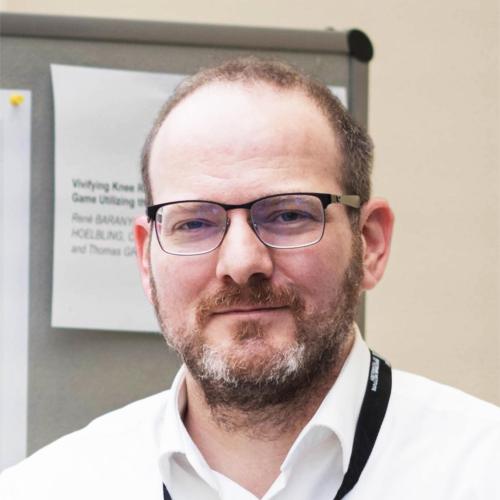
René Baranyi is a member of the Research Group for Industrial Software (INSO, founded by Prof. Grechenig) which performs at TU Wien and other universities in and outside Europe, bringing over 15 years of experience in the fields of Serious Games, Gamification, Medical Informatics, and Healthcare-IT. His expertise spans across Medical Information Systems, Sports and Lifestyle Medicine, Prevention, Physiotherapy, Rehabilitation Medicine, and exergame development.
René serves as an Associate Editor for JMIR Serious Games, advancing the understanding of how gaming technologies can be applied in healthcare. He is dedicated to digital platforms that simplify rehabilitation processes and promote healthier living. His work enhances patient engagement and outcomes and drives innovation in digital health, providing solutions that bridge the gap between technology and patient care.
He is deeply involved in large scale patient record projects in DACH, well understanding the critical design and method gaps between gaming experiments in research & science, industrial pilots, or massive multi user applications for millions.
The Future of Rehabilitation with (Serious & AI) Gaming-Tech
In an era marked by rapid technological advancements and significant social change, serious gaming is emerging as a transformative tool in rehabilitation. This talk examines how these immersive and interactive technologies are redefining the roles of therapists and elevating traditional rehabilitation methods into engaging and effective experiences. Serious gaming not only enhances individual patient outcomes but also supports therapists by improving their efficiency and scalability without sacrificing the quality of human interaction. Despite strong evidence of its effectiveness and potential cost savings, serious gaming has yet to be widely adopted in mainstream rehabilitation practices. We will explore the barriers to its adoption, the opportunities it presents, and the critical role of personalization and AI in adapting games to individual patient needs. Additionally, the integration of tele-rehabilitation offers new avenues to make these innovations accessible, overcoming social barriers and extending their reach.
Get Social
LinkedIn
Follow us on LinkedInFacebook
Join the ConversationYouTube
View Exclusive VideosInstagram
Latest Images